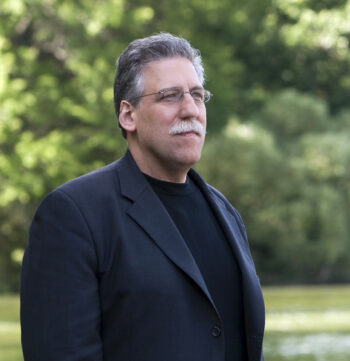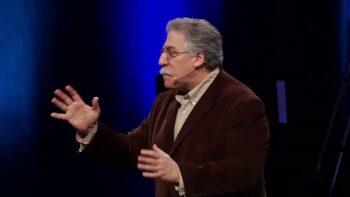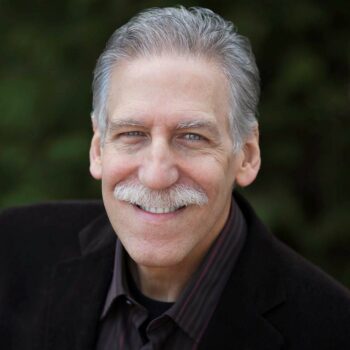Growing up in a Jewish household, Dr. Michael L. Brown believed Jesus was the God of Christians and had nothing to do with the Jews.
During his high school years he became a pothead and eventually earned the nicknames “Drug-Bear” and “Iron Man” due to his prodigious intake of drugs. He abused pot, hash, LSD, mescaline, amphetamines, cocaine and heroin.
“I would take massive quantities just to see how far I could go,” Brown says on a One For Israel video. ”I once did enough mescaline (a hallucinogenic drug) for 30 people — the equivalent of one ounce. I couldn’t distinguish between reality and hallucination.”
Between 1996 and 2000, Brown led the Brownsville Revival, a Christian Pentecostal Movement at the Brownsville Assembly of God church in Pensacola, Florida. He is currently a radio talk show host and also president and professor of practical theology at FIRE School of Ministry in Concord, NC.
Born in New York City in a respectable family, his father served as the senior lawyer in the New York Supreme Court.
 “My upbringing was typical of many New York, Conservative Jewish children. We moved to Long Island, I did well in school, I played lots of sports, and, like all my friends, I basically stayed out of trouble. But something changed. It all began innocently enough,” he said.
“My upbringing was typical of many New York, Conservative Jewish children. We moved to Long Island, I did well in school, I played lots of sports, and, like all my friends, I basically stayed out of trouble. But something changed. It all began innocently enough,” he said.
“When I was eight years old I started to play drums. There was no question that I had ability. In fact by the time I was fifteen I had played on a studio album. But my favorite music was rock, and after my Bar Mitzvah in 1968, I got interested in playing in a band. I wanted to be a rock drummer, and all my role models were known for their heavy drug use, rebellion, and flagrant immorality. I wanted to be like them!”
In 1969, at age 14, he was offered pot.
“I was only too happy to oblige,” he says. “Soon I tried smoking hash too. But neither one had any effect on me. So I tried harder drugs until I started using uppers, downers and LSD. I thought I wouldn’t do anything worse than that, but I was deceived.”
By age 15, he tried speed and heroin.
“I loved it,” he says.
 His grades crashed. Drugs, rock and “filthy living” were his daily portion. He and his friends broke into homes and a doctor’s office just for fun. Snatching up drugs wherever they entered, they nearly killed themselves.
His grades crashed. Drugs, rock and “filthy living” were his daily portion. He and his friends broke into homes and a doctor’s office just for fun. Snatching up drugs wherever they entered, they nearly killed themselves.
He was binging drugs, constantly pushing the outer edge of the envelope toward overdose.
At times, it was difficult to distinguish between hallucination and reality. “I would walk with my hand in front of my face at night because I didn’t know if the tree that was growing up in front of me was really there, or if the tree that grew up into fireworks, that they were really taking place,” he noted.
”I’d see a car coming at me, and suddenly it became a person: the lights became eyes and a mouth. I’d see someone walking their dog and they’d morph until they each became a little bit of each other.”
Brown wasn’t the type of person to fight, but he would bring people down with verbal volleys. He ripped into people until they were in tears.
He had been raised a conservative Jew, but wandered far from the faith of his family. He rarely thought of God, but when he did, he rationalized that he was a good person.
“If there really is a God, He knows I have a good heart,” he thought at the time.
Ultimately, it was the Book of Revelation that brought him to account. Some friends began attending church and telling him about the Beast with seven heads and 10 horns that emerged from the Bottomless Pit to rule the world. It sounded like an LSD trip.
“That’s in the Bible?” Brown asked his buddies. “That’s what they talk about in this church? That’s a cool church.”
So he started attending. He was a 16-year-old longhaired rocker with ripped jeans and stood out among the straight-laced older people. After a few services, he realized they were praying for him, “the big sinner.”
So one service, just to give the congregants a kick, with no sincerity or remorse for his sin, Brown decided to go up to the altar and accept Jesus.
“They’ll all be excited,” he thought. “I went up. I didn’t mean anything by it. I was just having fun.”
But as he repeated the sinner’s prayer saying he believed Jesus died for him, it suddenly hit him.
“Jesus took my place,” he thought. “I did all these bad things. He was perfect. He died for me.”
Faith filled his heart and what started as a joke became sincere.
“I promise to live for you all the days of my life,” he prayed, ending his altar call petition.
That day began a spiritual upheaval. He had promised to serve Jesus but hadn’t intended to do so. He really had no intention of giving up his sinful lifestyle. It would be a “deep spiritual battle,” he says.
His favorite activity in the world was attending rock concerts while high on drugs. He loved Led Zeppelin, Jimi Hendrix and Jethro Tull. As a drummer himself, he relished the rhythms.
But to his utter dismay, there was no drummer at church.
“The pastor’s wife is playing these little ditty hymns,” he says. It was a stark contrast from the bass-driven, amp-hyped heavy metal that was his life before. It was a little bit more than a letdown from the high excitement he was used to at concerts.
But in one church service — underwhelming music and all — he felt something better, something indescribable, unlike anything he’d ever felt at all the rock concerts.
“Suddenly I experience this joy that I’ve never experienced in my life,” he remembers. “Immediately, I thought, ‘Getting high on drugs? No. This is different. This is completely different. This must be what people call the joy of the Lord.’ I realized this is is how much God loved me. This is what Jesus did for me dying on the cross.
“This was the most amazing pure joy a human being could ever experience,” he says, remembering with relish the elation.
It was an epiphany. He no longer wanted the drugs or the concerts. He just wanted Jesus.
“I’ll never put another needle in my arm,” he said at the time.
His dad was thrilled he stopped taking drugs.
But he wasn’t at all happy that Brown believed in Jesus.
She dad carted him around town to talk to all sorts of rabbis in an effort to eradicate the Christian ideals from him. Brown didn’t mind. As a matter of fact, he was eager to share his faith in Jesus with his people.
As he talked to scholarly men, he realized he needed to study more. So he set out to learn Hebrew and deepen his knowledge of the scriptures.
“The more I studied, the more clear it was that I was completely on the side of truth in following Jesus,” he said.
Ultimately, Brown obtained a PhD in Near Eastern Languages and Literature from New York University.
He headed up a charismatic outpouring of the Spirit as pastor of the Pensacola, Florida Assemblies of God Church in Brownsville until the church’s board removed him in 2000.
He lives in Charlotte, North Carolina, with his wife Nancy Gurian Conway Brown. His syndicated radio show The Line of Fire airs throughout the United States and he serves as visiting professor of Jewish apologetics at Fuller Theological Seminary, School of World Mission.
While his dad worked hard to make his son return to Judaism, he also heard him preach and began to consider that Jesus could be the Messiah.
“He knew that this was something that only God could have done.”
Ryan Zepeda studies at the Lighthouse Christian Academy in Los Angeles.





I attended several weekends at Brownsville at it’s peak. I don’t remember this man but I do have an opinion about his backstory. Two years is not NEARLY enough time to have done all the drugs he claims to have done between 14 and 16 years of age. Be careful.
Comments are closed.